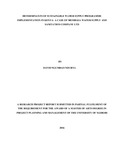| dc.description.abstract | Statistics around the world reveal that our fresh water supply is practically non-existent. Nearly 97% of the world's water is salty or otherwise undrinkable while another 2% is locked in ice caps and glaciers. The fact that only 1% of the earth's water is available for all of humanity needs such as agriculture, industrial and household needs brings to our attention that conservation of water requires our full attention if we hope to sustain our water projects . Therefore, the purpose of this study was to examine the determinants of sustainable water supply programme implementation in Kenya; a case of Mombasa Water Supply and Sanitation Services Company Ltd. The study was guided by four objectives that sought to: establish the influence of financial resources in the implementation of sustainable water supply programme in Mombasa County, establish the influence monitoring and evaluation in the implementation of sustainable water supply programme in Mombasa County, establish the influence of technology in the implementation of sustainable water supply programme in Mombasa County, and examine the influence of stakeholders in the implementation of sustainable water supply programme in Mombasa County. A descriptive research design was adopted for the study. The target population of 436 respondents and from this a stratified random sampling was employed to sample 87 respondents calculated at 20% as recommended by scholars like Kothari. A pilot study was conducted to check the instruments reliability and validity and the instruments were found to be valid and reliable. Data was collected using a structured questionnaire which was administered personally, via e-mails, enumerators and the drop and pick technique. Data was coded and analyzed using the SPSS version 20.0. The coded data was analyzed by use of descriptive (descriptive data) and quantitative (quantitative data) statistics comprising of frequency tables. The hypothesis was tested by use of Chi Square. 87 questionnaires were administered respondents. Out of the issued questionnaires, only 65 questionnaires were returned, fully filled and made the basic providers of primary information needed. 22 questionnaires were never returned. Therefore the response rate was 74.71%.The findings showed that, financial resources allocated for WSP implementation, the sources of finances, the various stages of monitoring and evaluation including the formative, summative and continuous M&E, modern technology integration in water supply, and the stakeholders like the community and the government have an influence in the implementation of the sustainable WSP. The study recommended that there is a need for MOWASSCO to identify various sources of finances, sufficient to run its projects and clear the debts it owes various bodies. Top management and other junior employees at MOWASSCO should embrace M&E at all levels and stages of operations by checking on areas that are deviating from the set objectives and corrections made. Modern technology should be integrated and continually advanced by procuring better technology, allocating more finances for technology and training both the employees and the consumers on the use of relevant technology. The stakeholders like the government, donors, NGOs and the local community also must be involved in all levels of addressing sustainable WSP implementation through resources mobilization, providence and management. Finally, the research recommended that similar study can be done on; other water service provider companies that split from the former Coast Water Services Board, the influence of community participation on the sustainability of the sustainable water supply programme by MOWASSCO and an evaluation of the same research in relation to the Sustainable Development Goals adopted from the previous MDGs | en_US |



